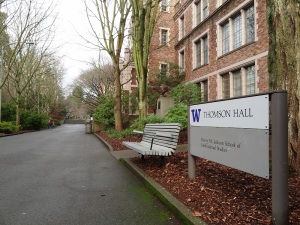The winter term starts today at the University of Washington (UW), where I will be spending the next 6 months as an EU Fellow. Founded in 1861, the University is one of the oldest and largest on the West Coast of the USA. It is also one of 10 US Universities that host an “EU Center of Excellence” designed to promote teaching and research on EU affairs.
The University has been pretty quiet since I arrived a few days ago in the middle of the winter break. I’ve enjoyed exploring the impressive facilities and picturesque campus on the shores of Union Bay, close to downtown Seattle. I have also had some interesting first exchanges with the new colleagues I will be working with at the Jackson School of International Studies.
One of the first activities I will be involved with is a “Task Force” involving a small group of international relations students from the Jackson School. The Task Force project is a regular feature of the International Studies Program. It requires students to work together collaboratively on a policy issue, taking into account insights from academic literature but also real life examples. Appropriately enough, given that 2013 is the European Year of Citizens, the theme that has been chosen for this year’s Task Force is the relationship between the European Union and its citizens.
In February, the University of Washington will be hosting a “Model EU”, which will give a group of over 50 students (from UW and other Universities) an opportunity to participate in role-playing exercises simulating EU negotiations. I’m looking forward to advising and observing the students, as well as evaluating their performance as negotiators!
I’ll also be continuing my research on digital media and public policy. I’m hoping to connect with several people who are doing interesting things here at the University of Washington, particularly in the Department of Communication, as well as contacts from the vibrant digital sector in Seattle and the wider Northwestern USA.
And finally, the Jackson School will be sending me out to speak about the EU at the University of Washington, other Universities in Washington State, as well as Universities in neighbouring Oregon, Idaho and British Columbia.
All of this adds up to an amazing professional and personal opportunity! A special thanks to my colleagues at the European Commission in Brussels who are covering for me while I’m participating in the fellowships programme. I’ll continue sharing my experiences here on the European Union 2.0 blog. In the meantime, I wish you all the very best for 2013!



Hi Tony!
Your programme seems amazing and so much linked to EU!
Best Wishes and looking forward to reading you on the Task Force and “Model EU” 🙂
Pingback: Looking at Europe through American eyes | European Union 2.0
Pingback: Bloggingportal.eu » Blog Archive » Week in Bloggingportal: The Prime Minister’s Speech
So far, your seminar on Europe 2.0 has been extremely interesting. Learning how internet technologies are shaping the political discourse within European states and how the public engages with political institutions, as well as their own societies, in the rapidly evolving West is essential for anyone who wants to properly understand both contemporary geopolitics and how the cultural discourse of Europe will continue to evolve.
By encouraging focused discussion between both the students and engaging in it yourself in a portion of the seminar, it breaks down the traditional “read-only” format of academic instruction and also mirrors the evolution of media itself from unidirectional content consumption to collaborative/community-community driven content engagement. This has fostered an environment where the class is able to draw on the cognitive surplus of our varied perspectives which include many people who have directly experienced the issues we cover. I am finding this course to be a refreshing change of pace from standard political science courses.
I’m looking forward to the rest of the quarter and expect to build a comprehensive understanding of the issues we cover.
Thanks, Shane. It’s always nice to receive positive feedback. I’m grateful to you and the other students for your active participation, both online and in class. Putting several brains together helps us to think and learn better!